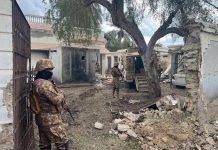On May 7, 2023, the fifth trilateral meeting of the foreign ministers of China, Pakistan, and Afghanistan took place in Islamabad. The three countries reaffirmed their commitment to advancing trilateral cooperation under the Belt and Road Initiative (BRI) and expanding the China-Pakistan Economic Corridor (CPEC) into Afghanistan.
Hafiz Zia Ahmad, Deputy Spokesperson of the Interim Ministry of Foreign Affairs of the Afghan Taliban, announced that Afghanistan has decided to join the multi-billion-dollar China-Pakistan Economic Corridor, transforming the landlocked country into a trade hub. This decision aligns with the Taliban administration’s goal of attracting foreign investment and integrating Afghanistan into the Belt and Road Initiative. It will facilitate the development of energy, railway, and other projects in Afghanistan.
The trilateral foreign ministers’ meeting was convened at the request of Chinese Foreign Minister Qin Gang to address security concerns between Islamabad and Kabul, which pose obstacles to Beijing’s Belt and Road Initiative. Journalist and analyst Abdul Basit Khan highlights that China’s major security concern in Pakistan is a Baloch separatist group. This group has been warning Beijing to reconsider its investments in the restive province of Balochistan. China is particularly concerned about the Majeed Brigade, a suicide squad associated with the Baloch Liberation Army.
Dr. Allah Nazar, a prominent leader of the Baloch movement, has also warned the international community about China’s ambitions. He stated that the Baloch are fighting against the Pakistani army for their national survival, and the presence of the Chinese army in Gwadar poses a regional and international threat. The powers involved should recognize this significant threat, and failure to address it will lead to regret.
To safeguard its interests, China is strengthening economic and diplomatic ties with various countries in the region. China’s closer relations with countries where Baloch activists seek refuge may complicate the Baloch national movement. However, investment projects in Balochistan will remain vulnerable unless the Baloch issue is resolved and steps are taken towards direct negotiations with Baloch organisations affiliated with Baloch national struggle. Such decisions would be beneficial for all parties involved.






























